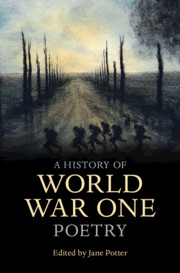Book contents
- A History of World War One Poetry
- A History of World War One Poetry
- Copyright page
- Dedication
- Contents
- Illustrations
- Contributors
- Acknowledgements
- Introduction
- Part I Literary Contexts
- Part II Nations and Voices
- Part III Poets
- Chapter 20 Non-Combatants
- Chapter 21 Edward Thomas (1878–1917)
- Chapter 22 Guillaume Apollinaire (1880–1918)
- Chapter 23 Siegfried Sassoon (1886–1967) and Edmund Blunden (1896–1974)
- Chapter 24 Anna Akhmatova (1889–1966)
- Chapter 25 Mary Borden (1886–1968)
- Chapter 26 Georg Trakl (1887–1914)
- Chapter 27 Isaac Rosenberg (1890–1918)
- Chapter 28 Ivor Gurney (1890–1937)
- Chapter 29 Wilfred Owen (1893–1918)
- Chapter 30 David Jones (1895–1974)
- Part IV
- Bibliography
- Index
Chapter 20 - Non-Combatants
from Part III - Poets
Published online by Cambridge University Press: 18 January 2023
- A History of World War One Poetry
- A History of World War One Poetry
- Copyright page
- Dedication
- Contents
- Illustrations
- Contributors
- Acknowledgements
- Introduction
- Part I Literary Contexts
- Part II Nations and Voices
- Part III Poets
- Chapter 20 Non-Combatants
- Chapter 21 Edward Thomas (1878–1917)
- Chapter 22 Guillaume Apollinaire (1880–1918)
- Chapter 23 Siegfried Sassoon (1886–1967) and Edmund Blunden (1896–1974)
- Chapter 24 Anna Akhmatova (1889–1966)
- Chapter 25 Mary Borden (1886–1968)
- Chapter 26 Georg Trakl (1887–1914)
- Chapter 27 Isaac Rosenberg (1890–1918)
- Chapter 28 Ivor Gurney (1890–1937)
- Chapter 29 Wilfred Owen (1893–1918)
- Chapter 30 David Jones (1895–1974)
- Part IV
- Bibliography
- Index
Summary
The poetry designated ‘non-combatant’ comes from a hugely disparate group. This chapter explores its range and diversity, illustrating how even those designated ‘non-combatant’ necessarily had their lives circumscribed by war. The poetry contests the assumption that non-combatant meant a naive response to the war that saw it in terms of adventure and sanitised sacrifice. Although this perspective exists, anxiety and loss are dominant themes, and many non-combatants attempted to understand the combatant experience. Others draw on their immediate domestic environment to contest the war, or to consider their peripheral position on the home front. Poetry can articulate the bitterness of those who felt excluded from participation, or the political stance of conscientious objectors asserting the validity of their position. Others, such as nurses, use their poetry to bear witness to suffering, and to memorialise non-combatant women who died in the service of their country.
- Type
- Chapter
- Information
- A History of World War One Poetry , pp. 331 - 349Publisher: Cambridge University PressPrint publication year: 2023

